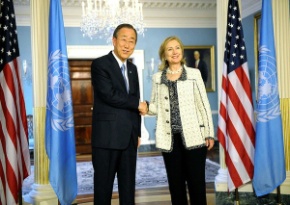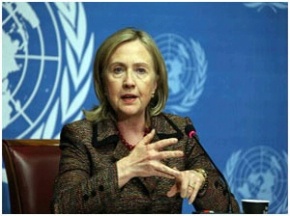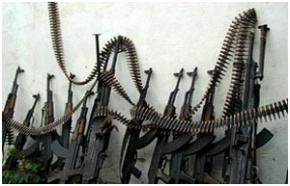The Arms Trade Treaty is the name of a potential multilateral treaty that would regulate the international trade in conventional weapons. The treaty was to be negotiated at a global conference under the auspices of the United Nations from July 2-27, 2012, in New York. Although the negotiations made substantial progress on a draft Treaty, they ran out of time as the negotiators were unable to reach consensus on the text. We anticipate the future actions concerning the potential Treaty will be raised at the UN General Assembly this fall. The United States supports a second round of negotiations, conducted on the basis of consensus on the Treaty next year. While we would have preferred to conclude the July negotiations with a Treaty, we believe that more time is a reasonable request for such a complex but critical issue
U.S. Support of the Arms Trade Treaty


On October 30, 2009, UN members voted in favor of forming an Arms Trade Treaty. 153 countries voted in favor, 19 abstained, and one country (Zimbabwe) voted against.
In 2009, Secretary Clinton announced U.S. support for negotiation under rules of consensus decision-making of an Arms Trade Treaty -- intended to establish common international standards for the import, export, and transfer of conventional arms to help prevent the acquisition of arms by terrorists, criminals, and those who violate human rights or are subject to UN arms embargoes. To read Secretary Clinton's statement in support of the Arms Trade Treaty, please go to: http://www.state.gov/secretary/rm/2009a/10/130573.htm. The U.S. has in place a very strong export control system, and we will use the opportunity of these negotiations to promote the same high standards for the entire international community. More information on the ATT»
Negotiations on the Treaty began in 2010, and we hope agreement on a Treaty will be secured in 2012. It will help to effectively regulate the international trade in conventional arms.
For more information on the U.S. Government’s Conventional Arms Transfer (CAT) Policy, please go to: http://www.state.gov/t/pm/rsat/c14023.htm
|
KEY U.S. REDLINES
-
The Second Amendment to the Constitution must be upheld.
-
There will be no restrictions on civilian possession or trade of firearms otherwise permitted by law or protected by the U.S. Constitution.
-
There will be no dilution or diminishing of sovereign control over issues involving the private acquisition, ownership, or possession of firearms, which must remain matters of domestic law.
-
The U.S. will oppose provisions inconsistent with existing U.S. law or that would unduly interfere with our ability to import, export, or transfer arms in support of our national security and foreign policy interests.
-
The international arms trade is a legitimate commercial activity, and otherwise lawful commercial trade in arms must not be unduly hindered.
-
There will be no requirement for reporting on or marking and tracing of ammunition or explosives.
-
There will be no lowering of current international standards.
-
Existing nonproliferation and export control regimes must not be undermined.
-
The ATT negotiations must have consensus decision making to allow us to protect U.S. equities.
-
There will be no mandate for an international body to enforce an ATT.
|
Why Is the United States Supporting the ATT Negotiations?
-
Conventional arms transfers are a crucial national security concern for the United States, and we have always supported effective action based on the highest standards of responsibility to control the international transfer of arms.
-
The United States has in place an extensive and rigorous system of controls that most agree is the “gold standard” of export controls for arms transfers. We engage and assist other states both bilaterally and through multilateral organizations and regimes to raise their standards and to prohibit the transfer or transshipment of capabilities to rogue states, terrorist groups, and groups seeking to unsettle regions.
-
An Arms Trade Treaty initiative conducted on the basis of consensus presents us with the opportunity to promote the same high standards for the entire international community that the United States and other responsible arms exporters already have in place to ensure that weaponry is transferred for legitimate purposes. More information on the ATT»
Elements of an Arms Trade Treaty (ATT)


U.S. OBJECTIVE
The United States is prepared to work for strong international standards in the international arms trade, provided that the Conference on the Arms Trade Treaty at the United Nations operates under the rule of consensus decision-making. Consensus is needed to ensure that all countries can be held to standards that will actually improve the global situation by denying arms to those who would abuse them and to avoid loopholes in the Treaty that can be exploited by those wishing to export arms irresponsibly.
SCOPE
-
The ATT should include all advanced conventional weapons, including tanks, armored combat vehicles, artillery systems, military aircraft, military helicopters, naval vessels, missiles, missile launchers, small arms and light weapons, and combat support equipment. It should also include parts, components, and/or technology to manufacture, modify, or repair the covered items.
-
The ATT should be limited to international transfers. Imports, exports, transit, transshipment, or brokering of conventional arms, whether the transfers are state-to-state, state-to-private end-user, commercial sales, leases, or loans/gifts.
PARAMETERS
-
No new international organization should be created to enforce an ATT. Exports will ultimately be a national decision.
-
Controls: Controls must be established on a national basis in accordance with laws and regulations. Governments must be able to control the import, export, transshipment, and brokering of the regulated items, in tangible or intangible form.
-
Criteria. Possible criteria for States Parties to employ in assessing applications for international transfers could include the following:
-
Applicable international law, including the UN Charter, arms embargoes, and other sanctions.
-
The human rights, terrorism, and proliferation record of the recipient and the potential for misuse of the export in question.
-
Appropriateness of the transfer in responding to or satisfying legitimate recipient security needs.
-
Impact on regional stability. The risk of adverse economic or political impacts within the recipient nation and the surrounding region, and the degree to which security needs can be addressed by other means.
-
Monitoring and Enforcement: The ATT should require signatory states to monitor and enforce the controls established, under their own domestic laws.
More information on Elements of Arms Control Treaty»
Remarks on ATT by former Under Secretary for Arms Control and Nonproliferation, Ellen Tauscher»
To learn more about U.S. Export Controls please go to: http://www.state.gov/strategictrade/resources/c43182.htm




